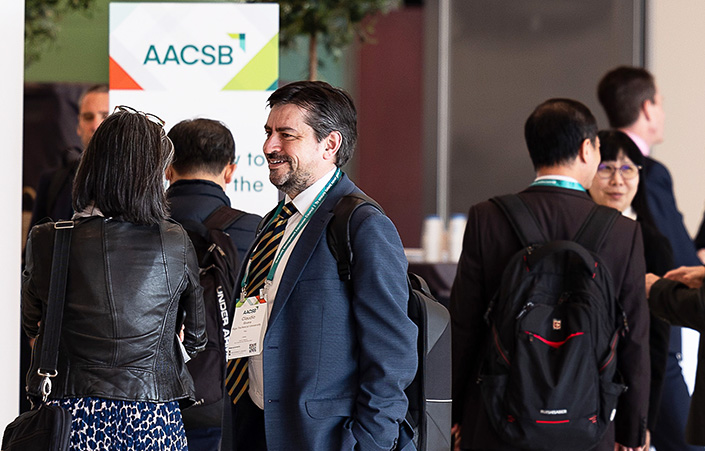Newly Accredited: Troy University on Earning AACSB Accreditation
In this series, AACSB spotlights business schools around the world that have recently earned AACSB accreditation. We ask the business school leadership about their journey to accreditation and what the new achievement means to them.
In this interview, Judson Edwards, dean of Troy University’s Sorrell College of Business, discusses how the years of hard work toward achieving accreditation have helped reposition the school not only for future success but for long-lasting pride among stakeholders.
Why was it important for your school to undergo the rigorous process of earning AACSB accreditation?
Though there were many important factors, I believe the decision to work toward the achievement of initial accreditation really started with our fundamental belief that our daily collective work is done for no other reason than to add value to the degree awarded by the Sorrell College of Business at Troy University. I also believe this decision was driven by a long-term strategic goal—to achieve and maintain a high-quality reputation. Nothing could demonstrate high quality more than becoming accredited by the organization comprising the best business schools in the world. I also must say the decision was very personal for me as an alumnus of the Sorrell College. I am very proud of the education I received and felt the achievement of AACSB accreditation was required by my university and long overdue.
What did you learn about your school through your accreditation journey?
Through this journey, I learned that our students, faculty, staff, alumni, and external stakeholders have a connection, commitment, and affection for the Sorrell College and Troy University far beyond my already high expectations. Seeing this come out during our accreditation effort makes me prouder than I can ever say. When I became dean in 2010, the achievement of AACSB accreditation instantly became our most important long-term goal. After serving on the faculty at other AACSB-accredited schools, I knew it would be a long, culture-changing process, requiring us to do our best to achieve the proper balance between the energy needed to drive change and the patience to allow the changes to mature.
What were the most challenging and rewarding parts of the accreditation process?
The most challenging part of the process was keeping the momentum going and instilling the belief in our people that we can cross the finish line. In the 1990s and early 2000s, the Sorrell College went through a couple of unsuccessful attempts with AACSB initial accreditation that did not help, particularly in the first couple of years of this journey. But we just pressed on.
I think the most rewarding part of the process was seeing how perceptions about the AACSB accreditation standards changed completely. Early on, the standards were obstacles we needed to overcome to get accredited. Yet over time, the standards were embraced throughout the organization because outputs from their adoption had produced so many positive results. It became very easy to see how our work toward alignment had made us a better business school in every area, from curriculum to external engagement.
What impact do you hope to see from having achieved AACSB accreditation?
I want the initial impact of AACSB accreditation to start with a boost of pride for our alumni. This was very important to them, and I know they are happy it finally reached a successful conclusion. I feel we have demonstrated our institutional commitment to alumni through this achievement and believe their willingness to give back both personally and financially will be significant going forward.
As for long-term impact, I believe the near-decade’s worth of work done to achieve initial AACSB accreditation has redefined and repositioned the future of the Sorrell College—not only by adopting a culture of continuous improvement, but most important, by creating the systems to operationalize and sustain it. But maybe most important in all of it is what it means to current and future students in terms of preparation and employability.
What advice would you give to another school approaching the accreditation process?
Be yourself. I think as we started the initial accreditation process, we took too much time looking at what other schools were doing and trying to make it fit our college. Most of the time, it did not work and left our committees, faculty, and staff paralyzed when it came to implementation. We gradually grew more confident in applying the standards to our organization, and that made all the difference.
Make the hard decisions early and accept personal responsibility. The old saying “no pain, no gain” could not be truer for a school entering initial accreditation and working to align with the AACSB standards. Upon reflection of the entire journey, the early “pain” is honestly what set us on the right path. There were many painful days in doing my job as dean, many painful days! Like cutting academic programs, requiring more research from our faculty, raising tenure and promotion standards, and not renewing unproductive faculty.
But the pain was not unique to me. As a college, from top to bottom, we each had to look in the mirror every day and give our individual best to drive the team to the goal. The slogan I used for our college throughout this process was borrowed from the airline industry, “Please secure your own mask before attempting to help others.” I think this would be my advice for all schools, and especially for fellow deans. Each person, internal and external, must first know the accreditation standards, and then as individuals, be motivated, stay focused, and feel personal responsibility for the accreditation goal. This ultimately will decide the success or failure of the entire accreditation process. Though we created financial incentive programs to assist in improving areas of need, like research quality and production, without the fundamental belief in the accreditation goal I just don’t think we could have been successful.
Trust the standards, be open, and let the process work. This is easier said than done, but as I stated earlier, the standards really do work. It is also important to embrace the integration of the AACSB staff, mentor, and visiting team leader into the accreditation process. I would recommend to any school going through initial accreditation to be an open book from the very start, especially in sharing your greatest concerns or challenges. My mentor, Linda Garceau, gave me some advice early in the process that I believe proved to be the most important in our ultimate achievement of accreditation. She could not have given me that help without knowing the serious problems. You will earn more respect from your support team by showing and then repairing the ugliest items, instead of trying to look perfect every step of the way.
I truly appreciate the opportunity to share these brief thoughts and hope something mentioned proves to be useful with the AACSB community. After overseeing the initial accreditation process from start to finish, I look forward to serving as a volunteer and doing my best to support other schools seeking AACSB accreditation—it has been a transformational, rewarding experience for all of us in the Sorrell College of Business at Troy University.





